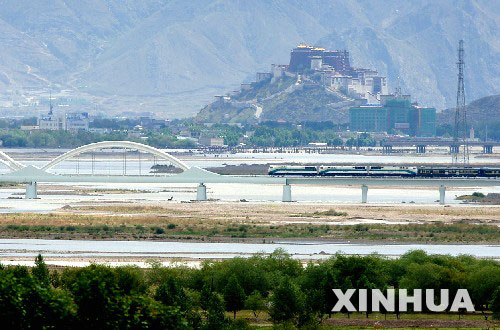Qinghai-Tibet railroad no harm to environment
(chinadaily.com.cn)
Updated: 2006-07-06 11:51
The newly launched Qinghai-Tibet Railway will certainly bring a lot of
travelers to Tibet, but it won't have a great impact on the local environment,
Qiangba Punco, Chairman of the Tibet Autonomous Region, said at a press
conference in Lhasa on July 4.

Qiangba Punco, Chairman of the Tibet
Autonomous Region, delivered a speech on the new Qinghai-Tibet Railway in
Lhasa on Tuesday. [Xinhua] |
The tourism industry will become Tibet's pillar industry because of the new
railroad, the Chairman said. As a smokeless industry, tourism could greatly
stimulate the development of correlative industries, but will have little impact
on the region's ecosystem and environment.
In 2005, a total of 1.8 million visitors came to tour Tibet's high altiplano,
generating nearly 2 billion yuan in revenue.
The Travel Bureau of the Autonomous Region predicted that there would be
about 5,000 people arriving in Tibet every day after the railroad was completed,
three or four thousand of whom would be arriving by train.

The first train to depart from Lhasa passes by
the Winter Palace of the Dalai Lamas on a bridge over the Lhasa River on
July 1. [Xinhua] |
A study predicts that the
annual number of travelers to Tibet will grow to 5.28 million in 2010,
generating revenue of 5.8 billion yuan for the region.
Qiangba Punco pointed out that Tibet's ecosystem was drawing the attention of
the whole country, with many citizens expressing concerns about its preservation
now that the new railway has been launched.
The central government has taken a series of measures to protect Tibet's
frail environment, including the construction of the National Environmental
Safety Defense for the Tibet Altiplano,which will cost 38.7 billion yuan.

Local residents dressed in traditional Tibetan
clothes dance in front of Anduo railway station to celebrate the launch of
the Qinghai-Tibet Railroad on July 1.
[Xinhua] |
Besides the tourism industry, trade
and social development will also be promoted after the rail route has linked
Tibet with other parts of China. Local residents and Tibetan herdsmen are among
those who will benefit from it.
Commodity prices in Tibet have traditionally been much higher than in the
interior of China because of the high cost of transporting goods such a long
distance. By reducing the cost of transportation, however, the new railroad
will cause commodity prices to drop significantly.
The railway will accelerate the integration of Tibet's economy into the
market of Eastern China and create more job opportunities as well.
A Ministry of Railways official said the Chinese government is planning to
build three more railway lines in Tibet over the course of the the next 10 years
as extensions of the newly-completed railway.
|